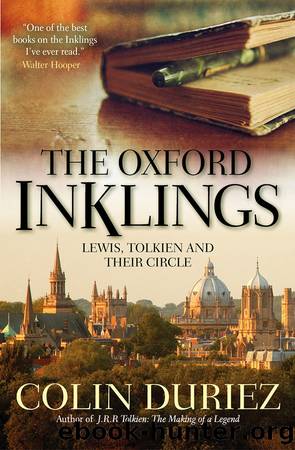The Oxford Inklings by Colin Duriez;

Author:Colin Duriez;
Language: eng
Format: epub
Publisher: Lightning Source Inc. (Tier 3)
Published: 2015-01-14T00:00:00+00:00
So what was it about âfairy storiesâ and fantasy that led Tolkien and Lewis in particular to want to rehabilitate them for a modern audience?
Their reasons for this interest were both personal and professional. Personally, they had both read and enjoyed such stories when young, in collections by the Brothers Grimm and Andrew Lang. Both had been captivated by George MacDonald, as in the stories of Curdie and The Golden Key. Professionally, they studied and taught the literatures of medieval romance, and in Tolkienâs case, he was immersed in the richness of Norse myth. They knew therefore that it was only quite recently that such tales had been regarded as âchildrenâs storiesâ. These were tales told and enjoyed by grown-ups through much of history. Even strong warriors enjoyed them, rejoicing in their triumphant moments, weeping at tragic turns of events. These stories told them important things about reality: about who they were and what the world was like, and about the realm of the divine.
Both men realized that there was a need to create a readership for these books again â especially for an adult readership, as we saw in the introduction. Lewisâs space trilogy came out of this same impulse to write the sort of stories that he and Tolkien liked to read. He felt he could say things in science fiction that he couldnât say in other ways. In the case of Tolkien, he had been expressing this growing realization for years when the two men met â ever since convalescing in the First World War, he had been writing hundreds of pages of his cycle of myth and legend from the early ages of Middle-earth.
Concerning education, Lewis argues in Rehabilitations that learning is the mature stage of education. It is an activity for people who have already been humanized by the educative process. Learning is marked by a desire to know: it is intentionally aimed at knowledge as a good in itself.
C.S. Lewis believed that we live today in a world that is fractured from the older world by what in later years he would call a Great Divide, which ushered in the age of the machine, as we saw. Our new age is dominated by a persistent idea of progress, in which the past is superseded.
Lewisâs approach in his fictional writings would become increasingly eclectic (a characteristic of an older poet he admired, Edmund Spenser); he drew freely and widely on the images and stories of the whole of the âOld Westâ. Tolkien had interests that were, and would steadfastly remain, more focused on the early English period of literature and northern mythology, but his aims were similar to Lewisâs. It is evident that he wished to encourage contemporary people to appropriate this important older history for themselves through his stories. He wanted them to take what Lewis called Old Western values and virtues into their contemporary lives instead of simply absorbing the narrow myths and presuppositions of modern thought and culture. Tolkien and Lewis wished
Download
This site does not store any files on its server. We only index and link to content provided by other sites. Please contact the content providers to delete copyright contents if any and email us, we'll remove relevant links or contents immediately.
4 3 2 1: A Novel by Paul Auster(11761)
The handmaid's tale by Margaret Atwood(7423)
Giovanni's Room by James Baldwin(6778)
Asking the Right Questions: A Guide to Critical Thinking by M. Neil Browne & Stuart M. Keeley(5338)
Big Magic: Creative Living Beyond Fear by Elizabeth Gilbert(5325)
Ego Is the Enemy by Ryan Holiday(4920)
On Writing A Memoir of the Craft by Stephen King(4647)
The Body: A Guide for Occupants by Bill Bryson(4560)
Ken Follett - World without end by Ken Follett(4427)
Bluets by Maggie Nelson(4244)
Adulting by Kelly Williams Brown(4212)
Eat That Frog! by Brian Tracy(4128)
Guilty Pleasures by Laurell K Hamilton(4098)
White Noise - A Novel by Don DeLillo(3818)
The Poetry of Pablo Neruda by Pablo Neruda(3797)
Fingerprints of the Gods by Graham Hancock(3719)
Alive: The Story of the Andes Survivors by Piers Paul Read(3713)
The Book of Joy by Dalai Lama(3675)
The Bookshop by Penelope Fitzgerald(3608)
